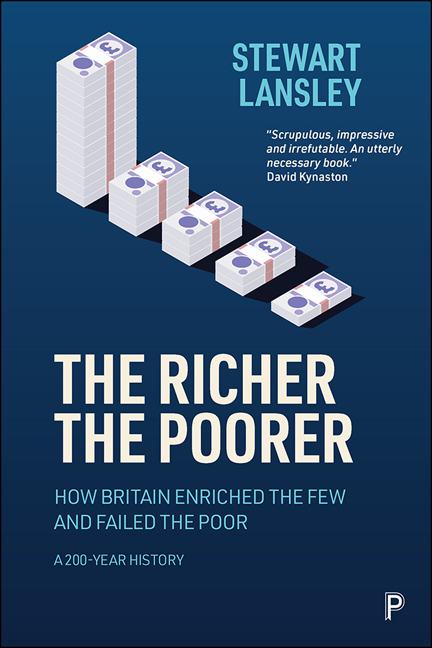Book contents
- Frontmatter
- Miscellaneous Frontmatter
- Dedication
- Epigraph
- Contents
- List of figures
- Preface and acknowledgements
- Introduction: Knighthoods for the rich, penalties for the poor
- PART I 1800–1939
- PART II 1940–59
- PART III 1960–79
- PART IV 1980–96
- PART V 1997–2010
- PART VI 2011–20
- Afterword: COVID-19 and ‘the polo season’
- Notes
- Index
- Frontmatter
- Miscellaneous Frontmatter
- Dedication
- Epigraph
- Contents
- List of figures
- Preface and acknowledgements
- Introduction: Knighthoods for the rich, penalties for the poor
- PART I 1800–1939
- PART II 1940–59
- PART III 1960–79
- PART IV 1980–96
- PART V 1997–2010
- PART VI 2011–20
- Afterword: COVID-19 and ‘the polo season’
- Notes
- Index
Summary
In October 1951, the Daily Herald carried the headline: ‘Poverty is Almost Down and Out.’ The Herald was reporting the results of the third survey of poverty by the now eighty-year-old Seebohm Rowntree. This was the first analysis of the anti-poverty effectiveness of the post-war reforms. The survey results, published just ten days before a general election, found that the proportion of York's working-class households in poverty stood at 4.6 per cent in 1950, a dramatic fall compared with the 1936 survey. ‘To a great extent’, wrote Rowntree's co-researcher George Russell Lavers, ‘poverty has been overcome by the welfare state’.
Although the survey was less rigorous than Rowntree's earlier work, the findings had an important influence on the politics of social policy. They showed ‘a remarkable improvement, no less than the virtual abolition of the sheerest want’, according to a leader in the Times. Labour had hung onto power in 1950 with a slender majority of five. They lost the 1951 election, despite trying to make capital out of Rowntree's findings and enjoying 48.8 per cent of the vote to the Conservative's 48 per cent. With a majority of seventeen, the seventy-seven-year old Winston Churchill, shaken by his 1945 defeat, returned to Number 10.
A Plimsoll Line for incomes
That poverty had finally been tamed was the central social story of the time. Apart from a few residual problems that could be solved by policy tweaks, Britain, it was widely believed, had turned its back on the squalor, deprivation and insecurity of the past. Part of Anthony Crosland's argument in his important and influential 1956 social democratic tract The Future of Socialism, and its claim that capitalism ‘had been almost transformed out of existence’ was that ‘primary poverty had been largely eliminated’. It was a view widely shared across the Labour party. As Barbara Castle, a leading figure on the party's left, put it, ‘The poverty and unemployment which we came into existence to fight have been largely conquered.’
With economic recovery initially slow in coming, heightened national debt and a new set of social priorities, the immediate post-war years were ones of continuing austerity and rationing.
- Type
- Chapter
- Information
- The Richer, the PoorerHow Britain Enriched the Few and Failed the Poor: A 200-Year History, pp. 65 - 73Publisher: Bristol University PressPrint publication year: 2021



